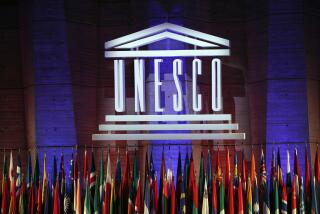Panel Split on U.S.-U.N. Ties After the Cold War : Policy: Conflict arose in commission appointed by Bush. It provides a foretaste of a debate expected this fall.
WASHINGTON — Two clashing visions of U.S. policy toward the United Nations in the post-Cold War world emerged Friday in a report by members of a commission appointed during the George Bush Administration to study the issue and make recommendations.
The 16-member commission was so split on the issue of the future relationship between the United States and the United Nations that four of the 10 members who signed the majority report wrote supplementary statements clarifying their positions and distancing themselves from the majority. Six commission members signed the minority report.
The conflicting views provide a foretaste of the grand debate that is expected in Washington this fall when the Clinton Administration outlines to Congress its detailed policies toward the United Nations and the role of U.S. troops in U.N. peacekeeping operations.
Rep. Jim Leach (R-Iowa) said that most of those in the majority looked on the United Nations as “the only global organization with a mandate to . . . build a consensus for a new world order.”
But former Deputy U.N. Ambassador Charles Lichenstein, who spoke for the minority, said he and his colleagues believed that “it was far from clear . . . that the United Nations is ready for the post-Cold War world.”
The minority expressed concern that the United States would downgrade its own interests in favor of those of the international community. Their report insisted that U.S. policy toward the United Nations “has to be based on an informed assessment of what the U.N. can, and cannot, be expected to contribute to U.S. interests.”
Lichenstein and his associates, who included former U.N. Ambassador Jeane Kirkpatrick, were disturbed by “the dysfunctional nature of the U.N.”
“ Mess is perhaps too strong a word,” Lichenstein said, “but no better one springs to mind.”
On the issue of peacekeeping, the majority recommended the creation of a U.N. legion of 5,000 to 10,000 highly trained volunteer soldiers who could rush into potential combat zones to prevent wars from flaring up.
“A U.N. legion,” the majority said, “would strengthen the hand of the secretary general in preventive diplomacy and be a useful arm of the Security Council for deterring conflict or providing early on-site reconnaissance.”
The minority, however, rejected the idea as a waste of money.
“The benefits claimed for such a rapid-deployment U.N. legion,” it said, “ . . . can be accomplished more effectively by the ready forces of U.N. member-countries, and at far less cost.”
“In any case,” the minority went on, “there is no evidence at all that the lack of such a force ever has barred or even deterred effective U.N. action to keep the peace.”
The U.S. Commission on Improving the Effectiveness of the United Nations was established by President Bush and leaders of Congress in 1988. Although the membership included Democrats like Sen. Claiborne Pell of Rhode Island, chairman of the Senate Foreign Relations Committee, the commission was looked on as heavily Republican and conservative.
More to Read
Sign up for Essential California
The most important California stories and recommendations in your inbox every morning.
You may occasionally receive promotional content from the Los Angeles Times.










